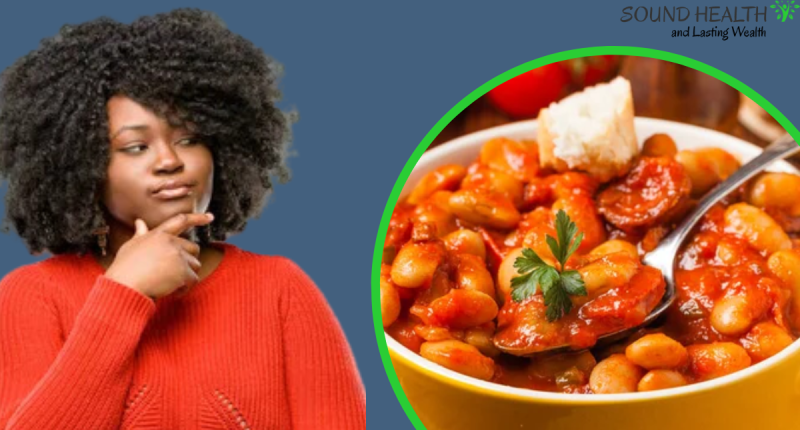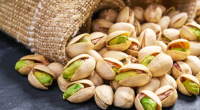Before we discuss “What Happens to Your Body When You Eat Beans Every Day?”, understand that beans are a nutrient-rich food that can be a healthy part of any diet. They are a good source of protein, fiber, vitamins, and minerals. However, eating beans every day can also have some side effects which include:
Gas and bloating
Gas and bloating are common side effects that many people experience when they eat beans regularly. Beans contain complex carbohydrates called oligosaccharides, which are known for their resistance to digestion in the small intestine. Instead, these compounds travel to the large intestine where bacteria ferment them, producing gas as a byproduct.
The increased gas production can lead to uncomfortable bloating and flatulence. It’s important to note that not everyone will experience these symptoms to the same extent. Some individuals may be more sensitive than others or have specific gastrointestinal conditions that make them more prone to gas and bloating.
Digestive discomfort
Digestive discomfort may happen to certain people who eat beans every day because of the complex sugar content called oligosaccharides, which are not easily broken down by the digestive enzymes in our bodies. As a result, these sugars can ferment in the large intestine, leading to gas and bloating.
The high fiber content of beans can also contribute to digestive discomfort. While fiber is important for overall gut health and regular bowel movements, consuming too much of it at once can overwhelm the digestive system and cause bloating or even diarrhea.
Additionally, some individuals may have difficulty digesting certain types of beans due to their specific enzyme deficiencies. For example, those who lack the enzyme alpha-galactosidase may struggle to break down oligosaccharides effectively, leading to increased gas production and abdominal pain.
Headaches
Headaches are a common complaint that many people experience from time to time. While there can be various causes for headaches, including stress, dehydration, or lack of sleep, some individuals may find that eating beans every day can trigger these painful sensations.
Beans are known for their high fiber content, which is generally beneficial for digestive health. However, the downside is that this high fiber content can sometimes lead to an increase in gas production in the stomach and intestines. This excess gas can put pressure on blood vessels in the head and result in headaches.
Furthermore, beans contain certain compounds called tyramines and histamines. These substances have been known to cause migraines and tension headaches in susceptible individuals. Therefore, if you are prone to headaches or migraines already, consuming beans daily may exacerbate these symptoms.
Nutrient interference
Nutrient interference is one of the potential side effects that can occur when you eat beans every day. While beans are undoubtedly a nutritious food, they contain certain compounds that can interfere with the absorption of other essential nutrients in your body.
One such compound is phytic acid, which is present in high amounts in beans. Phytic acid binds to minerals like iron, zinc, and calcium, forming complexes that are difficult for your body to absorb. This means that even if you’re consuming these minerals from other sources or supplements, their absorption may be hindered by the presence of phytic acid.
Additionally, beans also contain enzyme inhibitors which can interfere with digestion and nutrient assimilation. These inhibitors inhibit enzymes responsible for breaking down proteins and carbohydrates in your digestive system. As a result, it may lead to poor digestion and nutrient malabsorption.
Allergies
Allergies can be a frustrating and sometimes even dangerous reaction that our bodies have to certain substances. While beans are generally considered a healthy food, they can also cause allergic reactions in some individuals.
Bean allergies are not as common as other types of food allergies, but they do exist. If you have an allergy to beans, consuming them daily can lead to uncomfortable symptoms such as hives, itching, swelling, or even difficulty breathing. In severe cases, it may even result in anaphylaxis which requires immediate medical attention.
ALSO READ: Which Beans Cause Less Gas? Know The Less Gassy Beans To Eat
How to avoid or minimize negative side effects
Now that we’ve discussed some of the potential side effects of eating beans every day, let’s explore how you can avoid or minimize these issues.
1. Soak and Cook Beans Properly: One way to reduce the digestive discomfort caused by beans is to soak them before cooking. This helps break down complex sugars and makes them easier to digest. Additionally, be sure to cook beans thoroughly as undercooked beans can lead to gas and bloating.
2. Gradually Increase Bean Intake: If you’re new to incorporating beans into your diet, it’s best to start slowly and gradually increase your intake over time. This allows your body to adjust and reduces the likelihood of experiencing excessive gas or bloating.
3. Pair Beans with Complementary Foods: Combining beans with other foods that aid digestion can help minimize any negative side effects. For example, adding herbs like cumin or fennel seeds while cooking can enhance digestion.
4. Experiment with Different Bean Varieties: Not all bean varieties have the same impact on everyone’s digestive system. You may find that certain types of beans cause fewer side effects for you personally, so don’t be afraid to try different varieties until you find what works for you.
5. Consider Enzyme Supplements: Digestive enzyme supplements containing alpha-galactosidase may help in breaking down complex carbohydrates found in beans, reducing gas production.
DON’T MISS: Does Eating Beans Impact Children’s Height Positively?
Recipes and tips for incorporating beans into your meals
Recipes and Tips for Incorporating Beans into Your Meals
1. Bean Soups: Create hearty and satisfying soups by blending cooked beans with vegetables, broth, and spices. Try black bean soup with cumin and lime or white bean soup with rosemary for a comforting meal on a chilly day.
2. Bean Salads: Combine different types of beans like kidney beans, chickpeas, and edamame with fresh vegetables such as tomatoes, cucumbers, and bell peppers. Drizzle with olive oil and vinegar dressing for a nutritious salad packed with protein.
3. Bean Burgers: Make delicious plant-based burgers using mashed beans as the base. Mix cooked black beans or lentils with breadcrumbs, onions, garlic powder, herbs of your choice (such as cilantro or parsley), shape into patties then grill or bake until golden brown.
4. Bean Dip: Blend cooked cannellini or pinto beans together with garlic cloves, lemon juice, and tahini to create a creamy and flavorful dip perfect for snacking.
5. Bean Wraps: Fill tortillas or lettuce leaves with seasoned mashed kidney beans, avocado slices, tomatoes, and shredded cheese for quick and healthy wraps. Add salsa or hot sauce for an extra kick!
6. Bean Stews: Cooked beans make an excellent addition to stews. Combine them with lean meat, vegetables, and aromatic spices like cumin or paprika for a filling one-pot meal.
Alternatives to beans for those who experience severe side effects
1. Lentils: Lentils are a great substitute for beans as they offer similar health benefits. They are high in fiber, protein, and various minerals while being easier to digest compared to some types of beans.
2. Chickpeas: Another excellent option is chickpeas, which can be used in a variety of dishes such as salads or hummus spreads. They provide an ample amount of protein and fiber without causing the digestive discomfort associated with beans.
3. Quinoa: Although technically not a legume like beans, quinoa is a versatile grain-like seed that offers similar nutrient content including protein and dietary fiber.
4. Tofu: For those looking for plant-based sources of protein without the gas-inducing effects, tofu is an excellent choice. It’s made from soybeans and provides essential amino acids necessary for overall health.
5. Edamame: These young soybeans are packed with nutrients like folate and vitamin K while also being low in calories. They make for a great snack or addition to stir-fries.
DON’T MISS: 13 Foods That Make You Gassy
Conclusion: Moderation is key when it comes to any food in your diet
Incorporating beans into your daily diet can have numerous benefits for your overall health. They are packed with essential nutrients, fiber, and protein that can support weight management, heart health, and digestion. However, it’s important to be aware of potential side effects that may arise from consuming beans every day.
While some people may experience gas and bloating due to the high fiber content in beans, there are ways to minimize these negative side effects. Soaking dried beans overnight before cooking them can help reduce the levels of indigestible sugars responsible for gas production. Additionally, gradually increasing your bean intake over time allows your body to adjust more easily.
It’s also worth noting that different types of beans may affect individuals differently. Some people might find certain varieties easier to digest than others. Experimenting with different types of beans can help you determine which ones work best for you.








